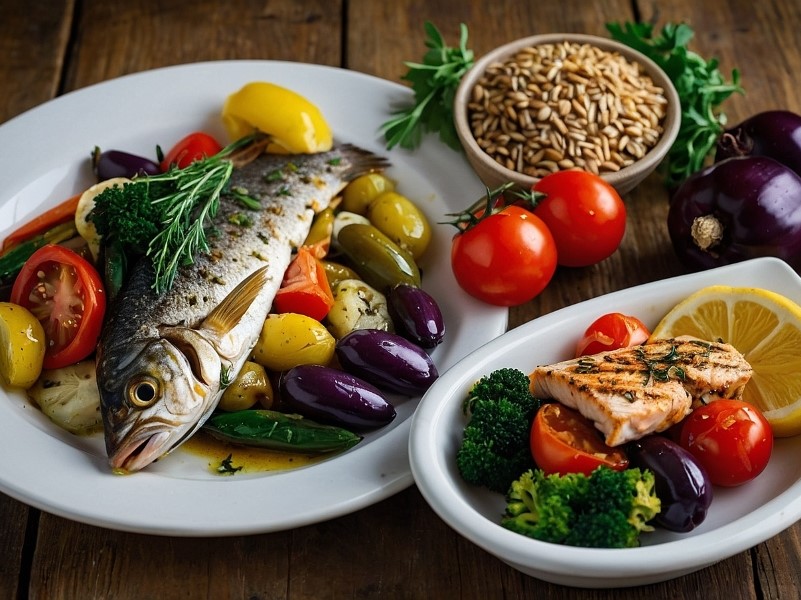Embracing a healthy lifestyle often begins with the choices we make about our diet. Among the myriad of dietary approaches available, the Mediterranean Diet stands out as a time-tested, evidence-based method for promoting overall well-being. Renowned for its heart-healthy benefits and delicious flavors, the Mediterranean Diet is more than just a diet—it’s a sustainable way of life that aligns perfectly with holistic health principles. In this comprehensive guide, we’ll delve into what the Mediterranean Diet entails, its key components, health benefits, and practical tips to incorporate it into your daily routine.
What is the Mediterranean Diet?
The Mediterranean Diet is inspired by the traditional eating habits of people living in the Mediterranean region, particularly in countries like Greece, Italy, and Spain. This diet emphasizes whole, minimally processed foods, fresh produce, and healthy fats, fostering a balanced and enjoyable approach to eating. Unlike restrictive diets, the Mediterranean Diet is flexible and adaptable, making it suitable for long-term adherence and diverse lifestyles.
Key Components of the Mediterranean Diet
Understanding the foundational elements of the Mediterranean Diet is essential for integrating it into your lifestyle. Here are the primary components:
- Fruits and Vegetables
- Variety and Abundance: Aim for a colorful array of fruits and vegetables daily to ensure a wide range of nutrients and antioxidants.
- Examples: Leafy greens, berries, citrus fruits, tomatoes, bell peppers, and cucumbers.
- Whole Grains
- Nutrient-Rich: Choose whole grains over refined grains to increase fiber intake and support digestive health.
- Examples: Brown rice, quinoa, whole wheat bread, barley, and oats.
- Healthy Fats
- Monounsaturated and Polyunsaturated Fats: Prioritize healthy fats that support heart health and reduce inflammation.
- Examples: Extra virgin olive oil, nuts, seeds, and avocados.
- Lean Proteins
- Fish and Seafood: Incorporate fish and seafood at least twice a week for their omega-3 fatty acids.
- Poultry and Eggs: Include moderate amounts of poultry and eggs.
- Plant-Based Proteins: Utilize legumes, beans, and tofu as primary protein sources.
- Dairy Products
- Moderation is Key: Opt for low-fat or fat-free dairy products like yogurt and cheese.
- Fermented Dairy: Incorporate fermented dairy for added probiotics and digestive benefits.
- Herbs and Spices
- Flavor Without Salt: Use herbs and spices to enhance flavor while reducing sodium intake.
- Examples: Basil, oregano, rosemary, garlic, and turmeric.
- Limited Red Meat and Sweets
- Occasional Consumption: Red meat should be eaten sparingly, and sweets reserved for special occasions.

Health Benefits of the Mediterranean Diet
Numerous studies have highlighted the Mediterranean Diet’s profound impact on various aspects of health. Here are some of the key benefits:
- Heart Health
- Reduced Risk of Cardiovascular Diseases: The diet’s emphasis on healthy fats, whole grains, and antioxidants helps lower cholesterol levels and reduce the risk of heart disease and stroke.
- Weight Management
- Sustainable Weight Loss: The balanced nature of the Mediterranean Diet supports healthy weight loss and maintenance without extreme restrictions.
- Diabetes Prevention and Management
- Improved Insulin Sensitivity: Whole grains, healthy fats, and fiber-rich foods help regulate blood sugar levels and reduce the risk of type 2 diabetes.
- Cognitive Function
- Enhanced Brain Health: The diet’s rich nutrient profile, including omega-3 fatty acids and antioxidants, supports cognitive function and may reduce the risk of Alzheimer’s disease.
- Longevity
- Extended Lifespan: Adhering to the Mediterranean Diet has been associated with increased longevity and a lower incidence of chronic diseases.
- Digestive Health
- Improved Gut Health: High fiber intake from fruits, vegetables, and whole grains promotes a healthy digestive system and prevents constipation.
- Anti-Inflammatory Effects
- Reduced Inflammation: The diet’s anti-inflammatory properties can alleviate symptoms of inflammatory diseases and promote overall wellness.
How to Start the Mediterranean Diet
Transitioning to the Mediterranean Diet is straightforward and can be seamlessly integrated into your existing eating habits. Here are some practical steps to get started:
- Stock Up on Essentials
- Pantry Staples: Keep extra virgin olive oil, whole grains, legumes, nuts, and seeds readily available.
- Fresh Produce: Ensure a steady supply of fresh fruits and vegetables.
- Plan Your Meals
- Weekly Meal Plans: Create a meal plan that incorporates Mediterranean staples for breakfast, lunch, dinner, and snacks.
- Balanced Plates: Aim for plates that are half filled with vegetables and fruits, a quarter with whole grains, and a quarter with lean proteins.
- Incorporate Healthy Fats
- Use Olive Oil: Replace butter and other unhealthy fats with extra virgin olive oil for cooking and dressings.
- Snack on Nuts: Opt for a handful of nuts as a nutritious snack instead of processed snacks.
- Prioritize Fish and Seafood
- Weekly Seafood Meals: Include fish and seafood in your meals at least twice a week for their beneficial omega-3 fatty acids.
- Embrace Plant-Based Proteins
- Legumes and Beans: Incorporate beans, lentils, and chickpeas into salads, soups, and stews as primary protein sources.
- Limit Red Meat and Sweets
- Occasional Indulgence: Reserve red meat for special occasions and keep sweets to a minimum, focusing on naturally sweet fruits instead.
- Stay Hydrated with Water
- Primary Beverage: Make water your go-to beverage, complemented by herbal teas.
- Enjoy Meals with Others
- Social Eating: Embrace the Mediterranean tradition of enjoying meals with family and friends, fostering a positive relationship with food.
Mediterranean Diet Recipes and Examples
Here are a few simple and delicious Mediterranean-inspired recipes to kickstart your journey:
- Greek Salad
- Ingredients: Cucumbers, tomatoes, red onions, Kalamata olives, feta cheese, and a drizzle of olive oil and lemon juice.
- Benefits: Fresh, crunchy, and packed with vitamins and healthy fats.
- Quinoa and Chickpea Bowl
- Ingredients: Cooked quinoa, roasted chickpeas, mixed greens, avocado, cherry tomatoes, and a tahini dressing.
- Benefits: High in protein and fiber, promoting satiety and digestive health.
- Baked Salmon with Herbs
- Ingredients: Salmon fillets, olive oil, garlic, rosemary, lemon slices, and a sprinkle of sea salt.
- Benefits: Rich in omega-3 fatty acids for heart and brain health.
- Mediterranean Lentil Soup
- Ingredients: Lentils, carrots, celery, onions, garlic, tomatoes, spinach, and vegetable broth.
- Benefits: A hearty and nutrient-dense option for a comforting meal.
- Whole Wheat Pita with Hummus and Veggies
- Ingredients: Whole wheat pita bread, homemade hummus, sliced cucumbers, bell peppers, and cherry tomatoes.
- Benefits: A balanced snack or light meal rich in protein and fiber.
Tips for Success on the Mediterranean Diet
Adopting the Mediterranean Diet can be enjoyable and sustainable with these helpful tips:
- Focus on Freshness
- Choose Whole Foods: Prioritize fresh, unprocessed foods over packaged and processed options.
- Experiment with Herbs and Spices
- Flavor Enhancers: Use a variety of herbs and spices to add depth and complexity to your meals without relying on excess salt.
- Cook at Home
- Control Ingredients: Preparing meals at home allows you to control the quality and quantity of ingredients, ensuring healthier choices.
- Stay Consistent
- Gradual Changes: Incorporate Mediterranean principles gradually, making small adjustments to your existing eating habits.
- Listen to Your Body
- Mindful Eating: Pay attention to hunger and fullness cues, and adjust portion sizes accordingly to maintain a healthy relationship with food.
- Join a Community
- Support System: Engage with like-minded individuals or join online communities for motivation, recipe ideas, and support.
Frequently Asked Questions (FAQs)
1. Is the Mediterranean Diet suitable for vegetarians or vegans?
- Yes: The Mediterranean Diet can be easily adapted for vegetarians and vegans by focusing on plant-based proteins such as legumes, tofu, and tempeh while eliminating animal products.
2. Can I lose weight on the Mediterranean Diet?
- Absolutely: The diet’s emphasis on whole foods, healthy fats, and balanced portions supports sustainable weight loss and maintenance.
3. How long does it take to see health benefits from the Mediterranean Diet?
- Varies by Individual: Some benefits, like improved energy levels and digestion, can be noticed within weeks, while others, such as reduced risk of chronic diseases, may take months or years to manifest.
4. Do I need to count calories on the Mediterranean Diet?
- Not Necessarily: The diet naturally promotes portion control and nutrient-dense eating, reducing the need for strict calorie counting.
5. Can I enjoy eating out while following the Mediterranean Diet?
- Yes: Choose restaurants that offer Mediterranean-inspired dishes, prioritize salads and grilled options, and ask for dressings and sauces on the side.
The Mediterranean Diet offers a harmonious blend of taste, nutrition, and sustainability, making it an excellent choice for those seeking a balanced and fulfilling lifestyle. By embracing fresh, whole foods and healthy fats, this diet not only supports physical health but also fosters a positive relationship with food and eating. Whether you’re aiming to improve heart health, manage weight, or simply enjoy delicious meals, the Mediterranean Diet provides a versatile and enjoyable path to holistic wellness.
Ready to Transform Your Life with the Mediterranean Diet?
Join our VitaMystica community today and gain access to exclusive resources, personalized meal plans, and expert guidance to help you embark on your Mediterranean journey. Subscribe to Our Newsletter and Follow Us on Social Media for the latest tips, recipes, and inspiration to support your path to balanced health and a fulfilling lifestyle.

